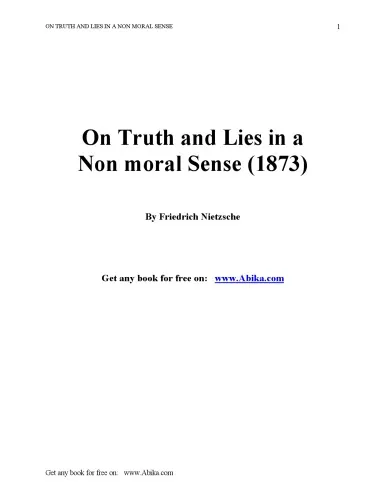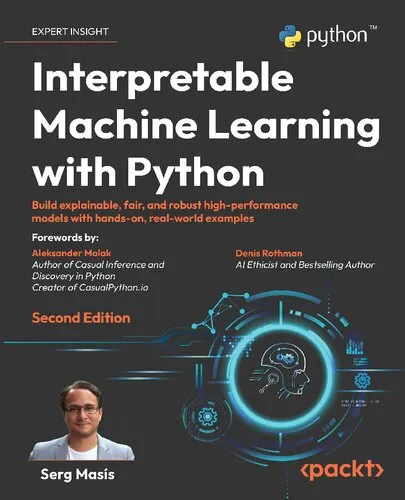On Truth And Lies In A Non Moral Sense
4.5
Reviews from our users

You Can Ask your questions from this book's AI after Login
Each download or ask from book AI costs 2 points. To earn more free points, please visit the Points Guide Page and complete some valuable actions.Related Refrences:
Introduction to 'On Truth and Lies in a Non-Moral Sense'
Friedrich Nietzsche’s essay, On Truth and Lies in a Non-Moral Sense, is a profound philosophical reflection on the nature of truth, language, and their interplay with human existence. Penned in 1873, this essay remains one of Nietzsche’s most incisive explorations of the human tendency to construct meaning through symbols and metaphors. Though brief, its arguments and ideas have sparked countless debates in philosophy, linguistics, and cultural criticism. By delving deeply into humanity's cognitive constructs, Nietzsche questions the very foundations upon which "truth" and "knowledge" stand.
For Nietzsche, truth is not an inherent characteristic of the world but a social convention steeped in illusion and pragmatism. Through vivid metaphors and razor-sharp critique, he challenges the reader to consider whether our understanding of reality is a construct based on convenience rather than concrete absolutes. This essay is an ideal starting point for anyone seeking to uncover Nietzsche's skeptical approach to traditional morality, epistemology, and the human condition.
Below, we present a detailed summary of the work, its key takeaways, notable quotes, and an explanation of its enduring importance.
Detailed Summary of the Book
In On Truth and Lies in a Non-Moral Sense, Friedrich Nietzsche begins by dismantling humanity’s hubristic claim to intellectual superiority. He argues that truth, as we understand it, is merely a human invention—a convenient framework designed to preserve social order. Nietzsche likens humans to ephemeral creatures who vainly celebrate their intellect, while failing to realize its relativity and limitations. The essay juxtaposes the ephemeral existence of mankind with the indifferent vastness of the universe, emphasizing the folly of human self-importance.
Nietzsche incisively critiques the concept of language, proposing that words are metaphors that carry no intrinsic connection to the objects or ideas they represent. Truth, according to Nietzsche, is nothing more than a consensus within a society—a product of linguistic conventions rather than an immutable reality. He dismisses the idea of "objective truth" as an illusion accepted out of necessity for societal functioning.
Nietzsche also explores the role of creativity and art, contrasting the imaginative artist with the rigid rationalist. Where rational perspectives strive to universalize and categorize experience, artistic ones embrace individuality and subjectivity. The essay ultimately suggests that artistic interpretations of reality might bring us closer to a fuller expression of life than the rigid constructs of "truth."
Key Takeaways
- Truth is not an objective, universal constant but a human construct shaped by language, culture, and pragmatism.
- Language and words serve as metaphors that distort reality, failing to convey a "pure" or true essence of things.
- Human beings cling to illusions of truth and knowledge to give structure to their otherwise chaotic and fleeting existence.
- Artistic creativity, by embracing subjectivity and metaphoric thinking, offers an alternative way to engage with reality beyond rigid rationalism.
- Nietzsche calls for a reevaluation of how we perceive truth, urging us to explore perspectives rooted in intuition, creativity, and individuality.
Famous Quotes from the Book
"What then is truth? A movable host of metaphors, metonymies, and anthropomorphisms: in short, a sum of human relations which have been poetically and rhetorically intensified, transferred, and embellished, and which, after long usage, seem to a people to be fixed, canonical, and binding."
"The drive toward the formation of metaphors is the fundamental human drive which one cannot for a single instant dispense with in thought."
"We believe that we know something about the things themselves when we speak of trees, colors, snow, and flowers; and yet we possess nothing but metaphors for things—metaphors which correspond in no way to the original entities."
Why This Book Matters
Though written over a century ago, On Truth and Lies in a Non-Moral Sense continues to resonate due to its unflinching critique of human assumptions about reality. This work challenges readers to question their reliance on language, science, and reason as definitive means of understanding the world. Nietzsche compels us to confront the possibility that our lives are structured around conventions and illusions, urging a reevaluation of how we define meaning, knowledge, and truth.
The essay has influenced countless intellectual disciplines, including postmodern philosophy, deconstructionism, and semiotics. It serves as a foundational text for those interested in critiquing traditional notions of objectivity and exploring the power of subjective, creative approaches to interpreting the world. For modern readers, it is a sharp and daring reminder of the fragility of human knowledge—and the boundless potential of human imagination.
In a world increasingly dominated by data and technology, Nietzsche’s philosophy invites us to pause and reconsider the frameworks that underpin our understanding of existence. His insights remain as vital today as they were when first written, making this essay a timeless piece of philosophical exploration.
Free Direct Download
You Can Download this book after Login
Accessing books through legal platforms and public libraries not only supports the rights of authors and publishers but also contributes to the sustainability of reading culture. Before downloading, please take a moment to consider these options.
Find this book on other platforms:
WorldCat helps you find books in libraries worldwide.
See ratings, reviews, and discussions on Goodreads.
Find and buy rare or used books on AbeBooks.
1208
بازدید4.5
امتیاز0
نظر98%
رضایتReviews:
4.5
Based on 0 users review
Questions & Answers
Ask questions about this book or help others by answering
No questions yet. Be the first to ask!





![The Ultimate iOS Interview Playbook: Conquer Swift, frameworks, design patterns, and app architecture [Team-IRA]](https://s3.refhub.ir/images/thumb/The_Ultimate_iOS_Interview_Playbook__Conquer__29925.webp)







